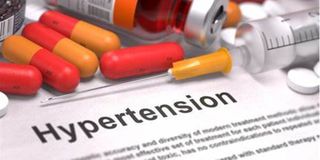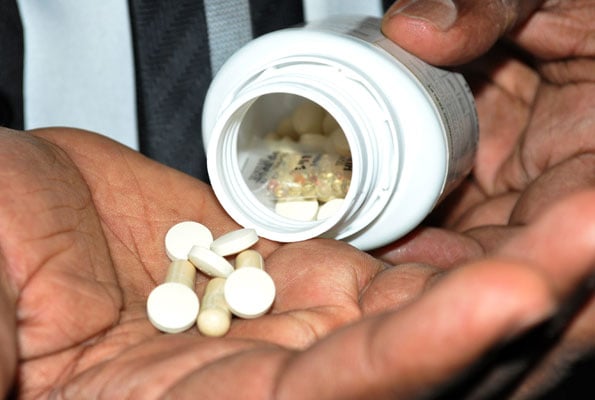The effects of hypertension drugs

I am hypertensive and because I have been taking hypertension drugs for a long time, my potency has declined. What can I do? A.L.T
Dear A.L.T,
When a man is unable to erect or erects but cannot sustain his erection long enough to engage in sexual intercourse to his partner’s satisfaction, he may be said to have an erectile dysfunction, commonly referred to as impotence.
An erection usually starts from the brain, which through nerves to the penis, causes the penile erectile tissues to relax and then take in as much as a six fold amount of blood to make the penile organ hard in what is called an erection. Stimulating a penile organ directly can also start an erection.
Much as you may think that the hypertension drugs could be the cause of your impotence, other factors such as old age, diabetes or psychological problems such as stress and anxiety or high blood pressure itself should not be overlooked. When an adult has blood pressure of 130/90 mmHg and above, they may be considered to have high blood pressure.
Unfortunately, high blood pressure hardens the body arteries including those entering the penis to protect them from bursting due to increased blood pressure. The hardening makes these arteries fail to dilate to take in more blood to cause an erection. Men with high blood pressure may also have low testosterone, leading to less firm erections apart from reduced sexual appetite necessary for an erection or sustaining it.
High blood pressure many times may coexist with diabetes both of which may lead to impotence.
While high blood pressure by itself can lead to erectile dysfunction, drugs used to treat it, especially water pills such as Lasix, and beta-blockers such as Inderal can also lead to erection problems yet they are the first drugs doctors usually give to a new patient.
Some high blood pressure medications are less likely to cause sexual side effects, but unfortunately, on review, men will not always tell doctors about the sex problems created by the drugs they were given even when the doctors make an inquiry about this.
Since people with hypertension may have erection problems and hypertension treatment may increase erection problems, it is useful that your hypertension is treated but with drugs which do not worsen the impotence.
In addition to drugs, lifestyle modification, which includes weight reduction, salt restriction, stopping smoking, taking alcohol in moderation, and regular physical exercise are essential.
Other causes of impotence such as diabetes, which usually coexist with hypertension have to be investigated and dealt with together with hypertension and impotence to make your life easier.
Should I worry about the colour of my baby’s poo?
My three-year-old baby has been passing green stool but does not cry or show signs of sickness. I have given her herbs but this has not helped. What can I do? teacher Phina
Dear teacher Phina,
Food starts being digested in the mouth and this digestion continues in the stomach and mostly ends in the small intestines. Largely, the remaining food, which enters the large intestines from the small intestines, is undigested and it is this food that forms stool that is passed through the anus. Stool is one of the best indicators of whether the body is correctly digesting food or not. It can also indicate good or bad intestinal and general body health.
Generally, stool is brown in colour because it contains the breakdown products of bile produced by the liver, which bile is usually yellowish green in colour. Bile is sent by the liver to the small intestines to help digest food and by the time the undigested food is released through the anus as stool, the bile will have undergone changes to make the stool look brown.
If food takes a shorter time in the intestines, such as when a person has diarrhea, the stool may be greener than usual because bile will not yet have undergone the said changes.
Diarrhoea can be caused by a bacterial infection such as salmonella or E. coli, a viral infection such as rotavirus, or a parasite such as Giardia apart from failure to absorb food (malabsorption). This diarrhoea, especially due to infection, is usually associated with symptoms such as dehydration, abdominal pain or a fever.
In most cases, if there are no symptoms even if the stool is green, taking water may be all that you need to keep the child from becoming dehydrated. Your child’s on and off green stool is likely due to a harmless condition such as, the green herbs you are administering, giving foods containing green leafy vegetables, green food colouring, or iron supplements.
While in the womb, babies do not pass stool unless when they are distressed. A newborn’s earliest stool (meconium), which is green in colour, is composed of materials ingested during the time they spend in the uterus. Sometimes, passage of meconium takes up to 48 to 72 hours before it changes to yellow.
So, green stool may be normal and harmless in some circumstances and in children, if not followed by symptoms or does not last many days, requires no treatment. However, keep in mind that the child may require more oral fluids, which you can ably give after consulting your doctor.




